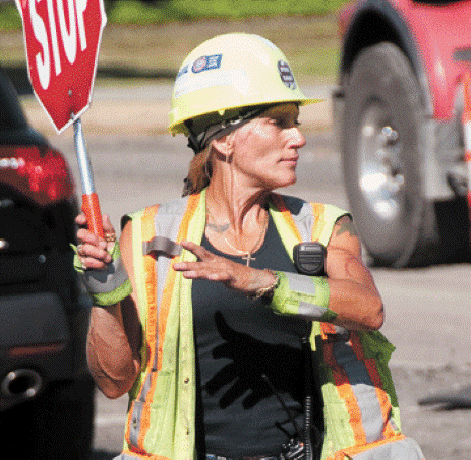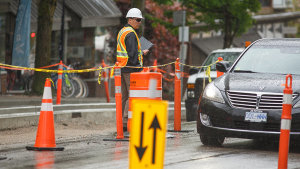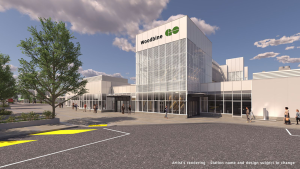The B.C. government and the RCMP have launched a province-wide initiative to improve safety for workers and traffic control persons in construction zones.
The B.C. government and the RCMP have launched a province-wide initiative to improve safety for workers and traffic control persons in construction zones. The crackdown includes increased enforcement on Highway 1 in Metro Vancouver.
“Words cannot adequately express how grateful the BC Flagging Association for Traffic Control People is to the province and the RCMP for improving the safety of workers and motorists in construction zones,” said Diane Herback, BC Flagging Association spokesperson.
“This added enforcement will make motorists drive with extra caution and allow us to remain safe at work.”
Last week, the B.C. Ministry of Transportation announced that RCMP and the province’s Commercial Vehicle Safety and Enforcement branch will be working together to increase enforcement.
The RCMP in Metro Vancouver have expressed serious concerns about drivers speeding at night through the Highway 1 construction zone.
However, they need more provincial funding to pay officers overtime for this enforcement.
“We have actually followed up to investigate those concerns and we have signed on to participate in the joint Ministry of Transportation-RCMP initiative that was announced this week to enhance enforcement in construction zones across B.C., which means enhanced enforcement on the Port Mann Highway 1 corridor during construction,” said Pamela Ryan, spokesperson for B.C.’s Transportation Investment Corporation, the crown corporation that was created to oversee construction of the new Port Mann Bridge, as well as the associated highway widening.
“We are participation in this newly enhanced program and this is in addition to what we have been doing in this corridor, such as lowering the speed limits and speed reader boards as a reminder to drivers to slow down.”
Ryan said that the Transportation Investment Corporation meets on a regular basis with Kiewit and the RCMP to discuss traffic.
“There has been a lot of movement in the last few days in getting overtime for that particular stretch of road, said Superintendent Norm Gaumont, with the RCMP’s Lower Mainland Traffic Services.
“We have had interest and a lot of meetings for enhanced enforcement.
Gaumont said the enhanced enforcement on Highway 1 will take place at night because the construction site is most active at that time of day and it has been reported that is when many drivers are speeding.
“”We will try to get our guys out there at night to send the message to the public that people have to drive appropriately,” he said.
“We have always had enhanced enforcement in construction sites, so we will continue to do that. This is an enhancement.”
The RCMP will be increasing enforcement on the Port Mann Highway 1 project and other projects around the province in the following ways:
Increase speed enforcement in active construction zones, where traffic control personnel are present;
Target distracted drivers using illegal handheld devices, or operating their vehicles unsafely;
Install additional speed reader boards in high-traffic construction zones across the province to alert drivers to slow down and drive with caution.
The construction speed limits from Grandview Highway to 208th Street in Langley were dropped to 80 kilometres in July.
Those caught speeding during this crackdown could face some stiff penalties.
Under the new speeding legislation, motorists caught driving 40 km/h over the posted speed limit will have their vehicle impounded for seven days and face escalating penalties for repeat offences.
Currently, in British Columbia fines for speeding in a construction zone can cost the offender up to $483.
The B.C. program for enforcing speed limits in construction zones started in 2007 with a series of one-year Memorandums of Understanding (MOU) that were renewed annually until last year, when the Ministry of Transportation signed a five-year MOU with the RCMP and the Ministry of Public Safety and Solicitor General.
The total value of the program is capped at a maximum of $150,000 per year.
At the start of each construction season, Ministry of Transportation and Infrastructure project managers are asked to submit construction projects requesting enhanced enforcement, the cost of which comes out of the ministry project budget.
The ministry compiles the requests and forwards it to the RCMP.











Recent Comments
comments for this post are closed